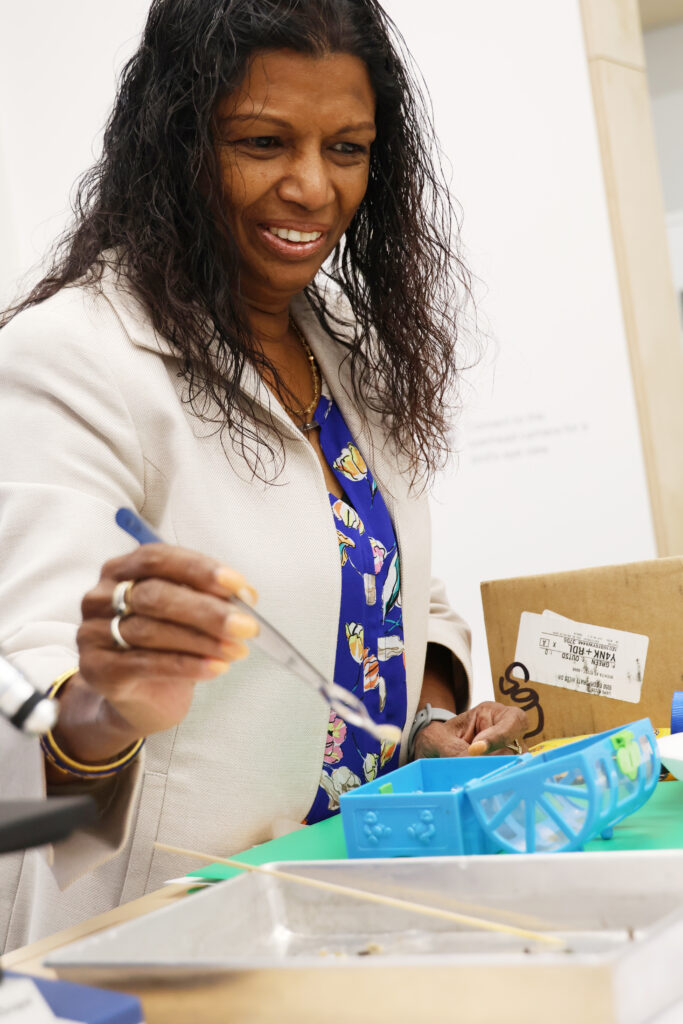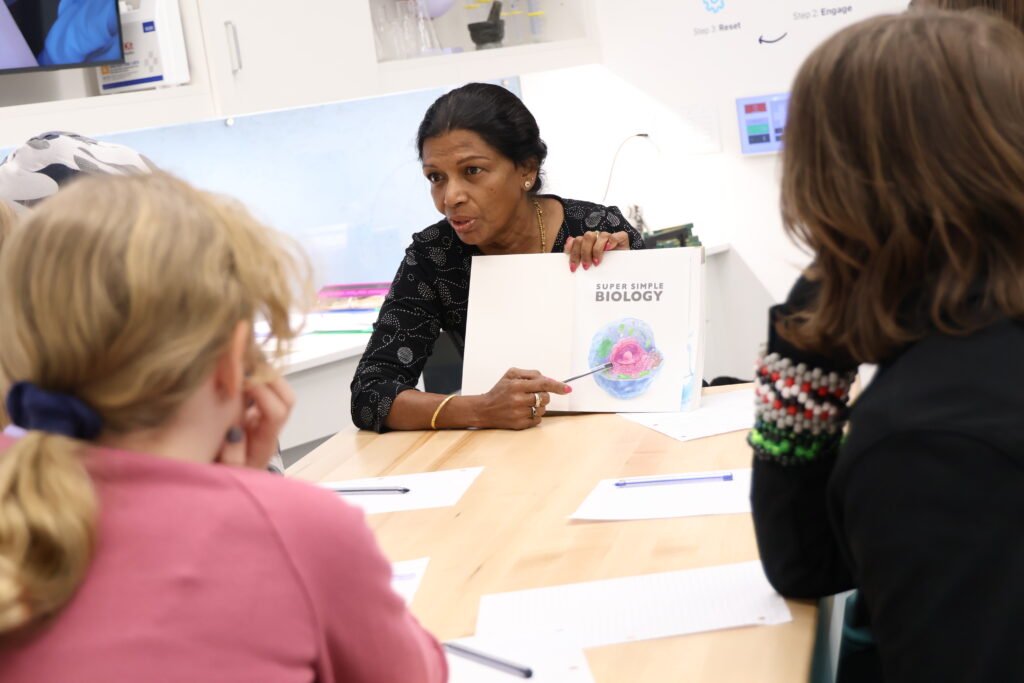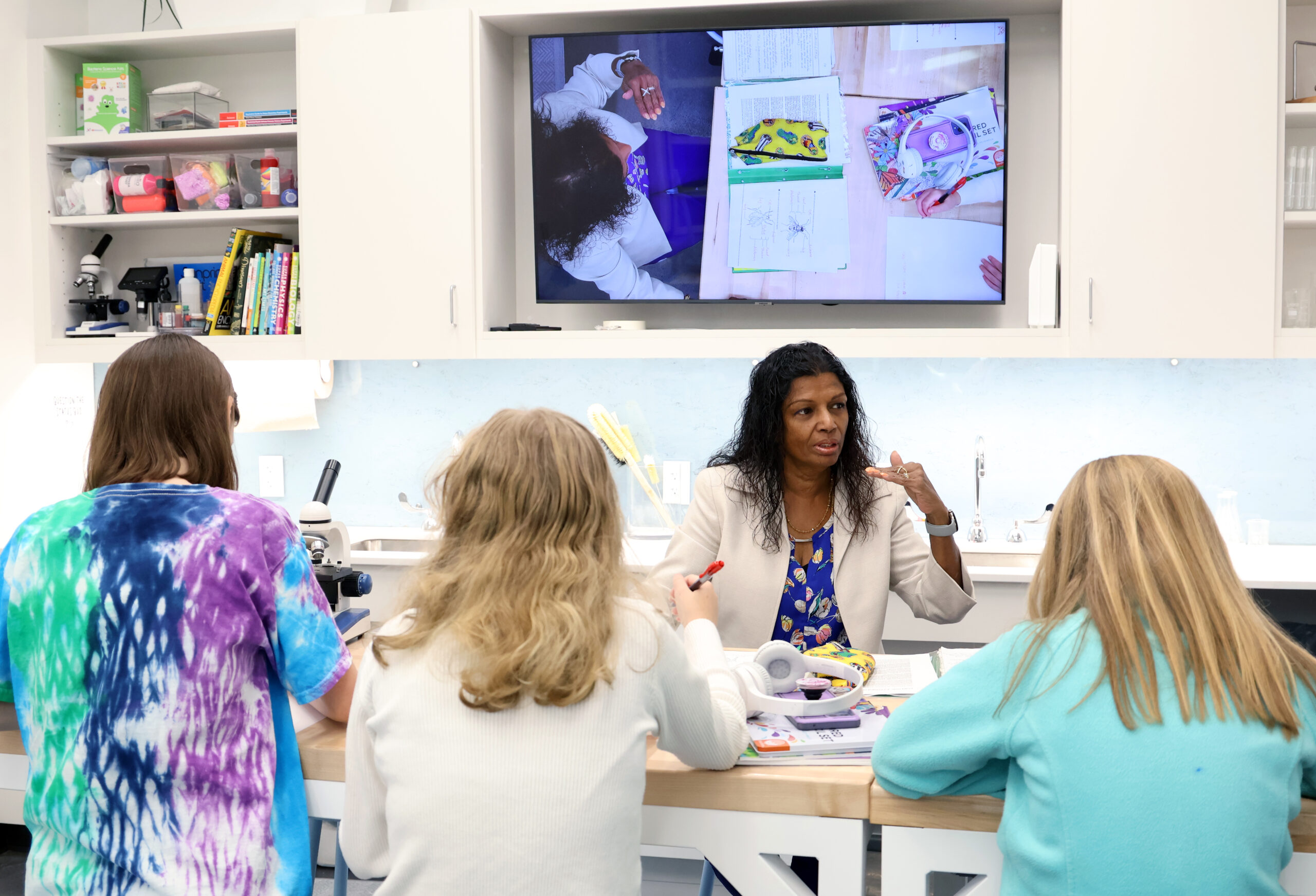The outline of a dead body is etched onto the floor in the Learning Lab Wichita STEAM Commons. Caution tape surrounds the outline, and a glance into the Mess Lab reveals bright red splatters of sticky liquid.
About 10 learners taking Chitra Harris’ Forensic Sciences course at Learning Lab Wichita hold magnifying glasses, inspecting the “blood splatters” to determine their shape, size, distribution, and position for clues. They are using what they’ve learned from Harris to make educated deductions about this staged crime scene.
Harris immigrated to the United States from India about 20 years ago, when she was in the middle of her teaching career. In India, she taught seventh and eighth graders biology, chemistry and art.
“In India, the path to being a teacher is very rigorous,” Harris said. “Your degree is a must. If I want to be a biology teacher, I must have a degree in biology — a four-year degree, then you go into your two-year teaching degree after that.”
When Harris came to the United States, she was hired for a four-week trial period at Wichita South High School, where she was then offered a permanent teaching position. In her 18 years at South, Harris taught through societal changes, including the onset of cell phones, the explosion of social media, and the aftermath of the pandemic.
“It got the kids disconnected from a classroom environment, and they got on devices more,” she said. “When they came back to school, they couldn’t put them down. We can’t teach them if they’re engrossed on devices.”
While Harris understands students need to learn technology, she said the best way to teach is through hands-on learning experiences.
“Learning hands-on is the best,” she said. “What they do with their hands, they remember more than what they just see. For me, it was teaching them and making them use what they learned that day in doing it for themselves.”

As a classroom teacher, Harris worked to make her biology classes engaging by incorporating experiments and real-life simulations. She drew on her own experiences as a child learning in India to create a classroom environment where students would learn to love science.
“If we were learning about insects and animals, I wanted to be out looking at insects and animals,” she said. “The application to daily life is so important. As a child, I got into a lot of trouble because I would catch flies and wounded animals and bring them home.”
Harris continuously sought to learn more about science and teaching to increase the effectiveness of her classes. She attended the National Science Teaching Association conference in Chicago, and she pursued her master’s degree at Southwestern College, where she was later inaugurated into the school’s Educator’s Hall of Fame.
When USD 259 Wichita Public Schools decided to pilot a forensic sciences class, Harris was the natural choice to figure out a curriculum.
“I created innovative labs on how to teach ballistics and guns when there was a zero-tolerance guns policy, how to use drugs when there was no way to use anything drug-related,” Harris said. “I got them to study the biology of the drug, to see what it does in their system.”
The forensic sciences curriculum Harris developed for Wichita Public Schools is now used by the state of Kansas for all high schools offering the course. Harris even went on to offer Forensic Sciences 2 at South High School.
Harris retired from the public school system two years ago, but not before winning numerous teaching awards — including being named a 2018 Kansas Master Teacher by Emporia State University. This prestigious recognition is only given to seven teachers in the state each year.
Now, Harris is offering forensic sciences to younger students, fourth through eighth grade, at Learning Lab Wichita. Her next course is on Fridays, starting March 7 and running through May 23.
“The forensics class is one of my favorite classes I’ve ever taken,” said Lucy Snider, age 11, who took the course series Harris offered in the fall. “Chitra is a good teacher and makes the lessons fun. I think the class has made me more observant of my surroundings. It is interesting to learn how investigators use evidence and science to solve crimes. I’m excited to continue learning more in the spring class.”
Harris’ love of science seems to be contagious.
“I love being with children,” Harris said. “I have so much knowledge; I want to pass on that love for learning I still have. To see kids’ faces light up with discovery that they ‘got it,’ that is the best reward.”
Harris shared words of wisdom for educators trying to increase student engagement in their classrooms. Here are some of her teaching tips:

• “You have to get students interested and wanting to know more. If they want to know, you give them ways to figure it out for themselves. You have to guide them. Without them realizing it, you have to channel their energy so they’re on the right track. When they discover the right answer, they’re like, ‘Wow!’ You can see the light shining on their faces. They learned it on their own; no one told them.”
• “Planning and preparation is what makes your class really good. You have to incorporate a lot of adapting, knowing your students and catering to their individual needs.”
• “They have to like you first. Make them feel proud of what they do, and they’ll like doing it. When you work together with them, lead them and they are successful — if you help them succeed, they like you. They know their goals are your goals.”
• “You have to know your material thoroughly. You can’t teach when you’re not sure about things. Do a lot of reading and have your bucket of knowledge full. You can’t give everything to every kid all the time, but because you’re so full of knowledge, it’s going to be better quality.”
Click here to register for Chitra Harris’ Fun Fridays forensics course, and view Learning Lab’s additional learning opportunities.

